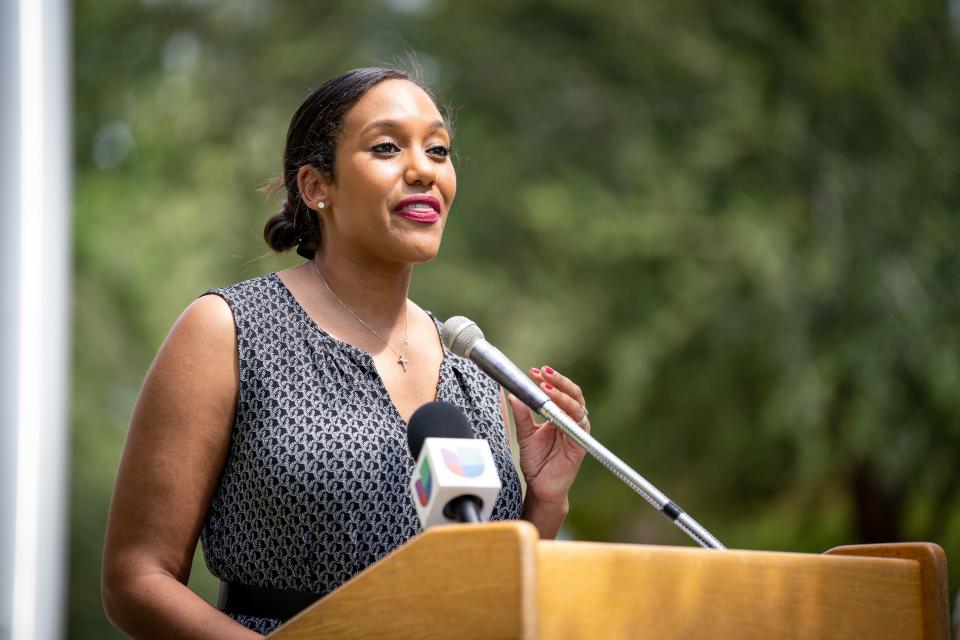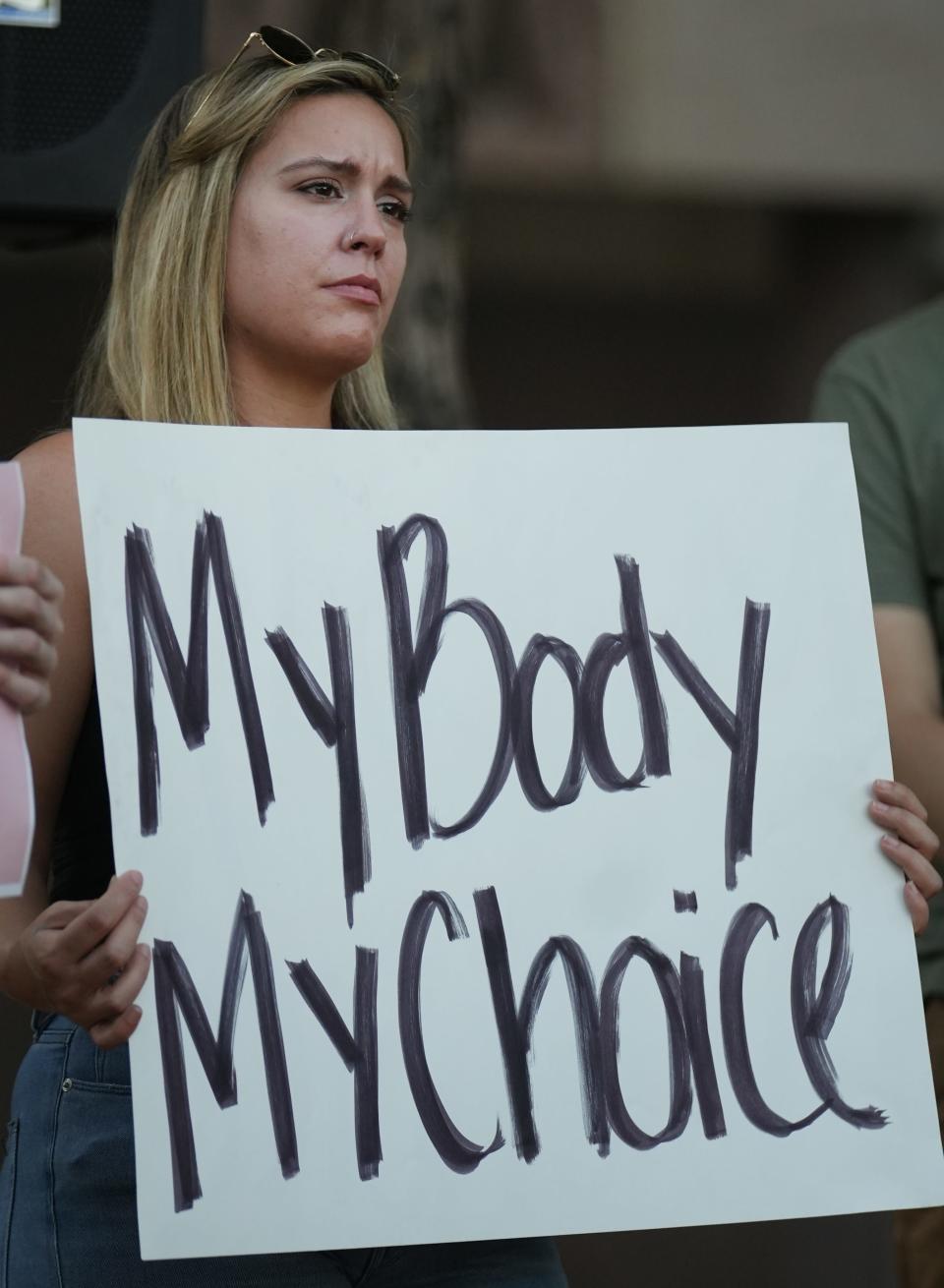Abortions have resumed in Arizona but the threat of a near-total ban looms
- Oops!Something went wrong.Please try again later.
Abortions are legal in Arizona but providers told Rep. Ruben Gallego Tuesday that reproductive care in the state is still hindered by politics.
Clinics that provide abortions in the state are struggling to find staff, patients are confused and fearful, and because of a new Arizona law, clinics must now turn away patients seeking abortions who are past 15 weeks of pregnancy, providers told Gallego, D-Ariz.
Gallego, whose 7th Congressional District includes parts of Phoenix and Glendale, hosted the roundtable discussion with reproductive health providers at Planned Parenthood Arizona's Phoenix headquarters. While abortions up to 15 weeks are legal in Arizona, the courts could reinstate a 19th century near-total ban.

"The ongoing threat of the near-total ban on abortions looms big," said Brittany Fonteno, president and CEO of Planned Parenthood Arizona, which is the state's largest abortion provider. "Arizona's ban is one of the most cruel and extreme in the country. It has no regard for the health and lives of people across the state, including survivors of rape and incest."
Gallego said during the discussion that he does not think government should be disrupting the "sacred" physician-patient relationship and noted that many abortion laws are coming from men who don't understand the female reproductive system.
It is important to hear from providers at a time when a near-total abortion ban remains a possibility in Arizona, Gallego said. Also, the next Arizona Legislature could be "even more radical" than today's, he said.
"It's such a complicated issue and the most important reason why I say it's a complicated issue is because when it gets this complicated, the government should not be involved," Gallego said. "At the end of the day, this is why we trust women, for them to take care of their bodies, and government should not be involved in that."
Abortion rights, economic stresses: These issues are top of mind for many Arizona women as they vote
Incest victim couldn't get an abortion in Arizona, doctor says

The roundtable discussion was held nearly four months after the U.S. Supreme Court's June 24 decision to reverse the nearly 50-year-old landmark Roe v. Wade decision, which protected an individual's right to choose to have an abortion.
States were left to make their own abortion laws in the wake of the decision, which translated into a lot of confusion in Arizona about whether a pre-statehood law that bans nearly all abortions or a 15-week ban passed earlier this year were in effect here.
Arizona Attorney General Mark Brnovich was behind an effort to reinstate the near total 19th century ban. Planned Parenthood went to court to block Brnovich's bid to lift a 1973 injunction that prevented its enforcement.
While Pima County Superior Court Judge Kellie Johnson ruled in Brnovich's favor, the Arizona Court of Appeals on Oct. 7 put the pre-statehood era abortion law on hold until a full appeal of the earlier ruling on it is heard. The appellate court's action once again legalized abortion in Arizona, at least for now.
However, abortion providers now must follow the state's 15-week abortion ban, said Dr. Jill Gibson, medical director for Planned Parenthood Arizona. While abortions after 15 weeks are only a small percentage of abortions that happen in Arizona, the 15-week ban already is having an adverse effect on some patients, Gibson said.
Gibson told the story of a patient who became pregnant because of incest but did not realize it until recently, when she was already more than 15 weeks into her pregnancy. The patient's mind did not allow her to realize or acknowledge she was pregnant until she was at more than 15 weeks likely because of the trauma she'd experienced, Gibson said.
The patient told Gibson that the only thing she needed to recover from the trauma of the incest was to terminate the pregnancy, but Gibson had to tell her she would not be able to obtain an abortion in Arizona. The patient had to travel to California to obtain an abortion, she said.
"To not be able to offer her that service is unbelievably devastating," Gibson said.
Prior to the 15-week ban, surgical abortions in Arizona were legal up until fetal viability, which is typically at 23 weeks to 24 weeks of pregnancy.
Medication abortions are still legal in Arizona, at least pending another court ruling. A medication abortion, sometimes referred to as the abortion pill, is a two-drug combination recommended for use up to 10 weeks of pregnancy that accounts for more than half of U.S. abortions.
'Our communities need more access to health care, not less'
On at least two occasions after the reversal of Roe v. Wade, most of Arizona's nine licensed abortion clinics stopped offering both surgical and medication abortions because of fear of criminal prosecution.
As a result of that uncertainty, the canceled appointments and ongoing fear, it's difficult to find staff, said Dr. DeShawn Taylor, an obstetrician/gynecologist and the founder and owner of Desert Star Family Planning in Phoenix.
"We're still in a pandemic. People want full-time work," Taylor said
Criminalizing abortion will never reduce the need and demand for abortions, which are an essential part of health care, Fonteno told Gallego.
"Banning abortion just serves to further our country's shameful legacy of racism and discrimination because it will have the greatest impact on Black, Indigenous, Latino and other people of color, young people and rural communities," Fonteno said.
"As a mother and a woman of color myself, I know that in order to attain equity in health and in life, our communities need more access to health care, not less, and certainly not criminalization for making our own personal decisions about our bodies, our lives and our futures."
Reach the reporter at Stephanie.Innes@gannett.com or at 602-444-8369. Follow her on Twitter @stephanieinnes
Support local journalism. Subscribe to azcentral.com today.
This article originally appeared on Arizona Republic: Arizona abortion clinics are struggling to find staff, providers say

